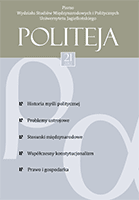Między II a III Rzeszą. Szkic z dziejów niemieckiej demokracji parlamentarnej w latach 1918-1933
Between the Second and the Third Reich. A view on the history of German parliamentary democracy in the years 1918-1933
Author(s): Marek MaciejewskiSubject(s): History
Published by: KSIĘGARNIA AKADEMICKA Sp. z o.o.
Summary/Abstract: The article analyzes the political system of Germany during the so-called Weimar Republic, i.e. the 1918-1933 period of creation and shaping of parliamentary democracy. This model was very critically evaluated in Germany then by many diverse political factions – with the exception of its creators, i.e. Social Democrats. Negative opinions on the Weimar republic seem also dominant in the scholarly literature on the subject. There exists a predominate conviction that this political model turned out to be an unfulfilled or crippled democracy and that the Weimar republic was an ephemeral being which was ‘suspended’ between the Imperial Second Reich and the Nazi Third Reich. Pondering the questions of this republic place in Germany’s history, the author mainly focuses on some research issues. One of those issues is the analysis of the foundations of Reich’s Constitutions from 1919 which constituted a legal basis of parliamentary democracy in Germany after World War One. According to the author, the Constitution itself wasn’t a defective regulation although its application often led to distortions of democratic rule (for instance, due to the abuse by Reich’s President of his prerogatives described in Article 48). The next research issue which is taken up in the article concerns the evaluation of the Weimar republic party system. The author reflects on the causes of parliamentary coalition – which was a mainstay of democratic rule during the 1918-1933 period – weaknesses and deficiencies. In this context, the author analyzes the issue of dimensions, impact and successes of anti -Weimar opposition, both in the beginning and at the end of Republic. During the decline of democratic rule the particularly important role – as far as the dismantling of Weimar institutions is concerned – was played by Nazi part and other Nationalist organizations. The next research issue taken up in the article concerns the question of the influence social -and -economic conditions on the shaping of parliamentary democracy system. From this standpoint, three period can be distinguished in the history of Weimar Republic. The first (the beginning of the Twenties) and the third (at the turn of the Twenties up until 1932/1933) were marked by deep crisis which exerted a harmful influence on the functioning of parliamentary democracy. Only the second period of the Weimar Republic history (the second half of the Twenties) was favorable from socioeconomic perspective. It was during this time that parliamentary -democratic governments were even able to achieve certain successes in the domestic and foreign policy.
Journal: Politeja - Pismo Wydziału Studiów Międzynarodowych i Politycznych Uniwersytetu Jagiellońskiego
- Issue Year: 9/2012
- Issue No: 21
- Page Range: 97-118
- Page Count: 22
- Language: Polish

